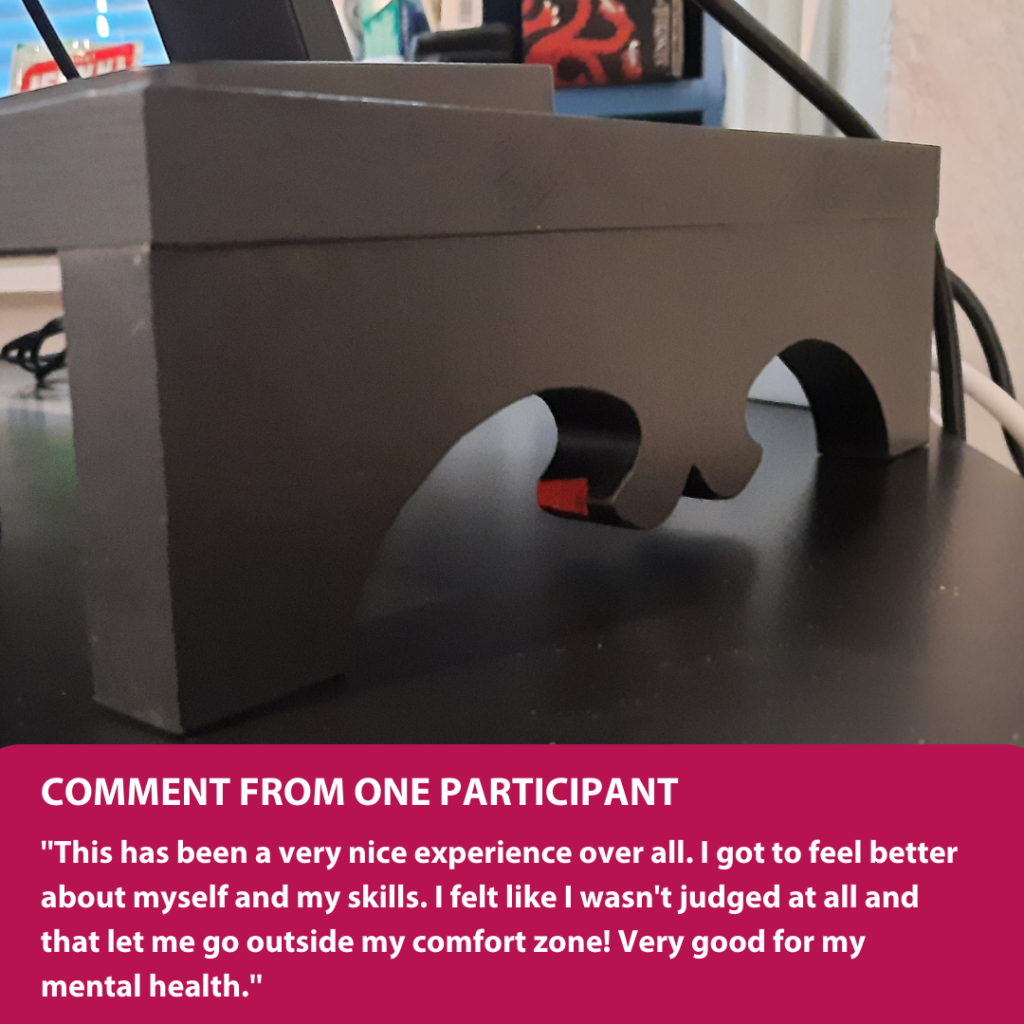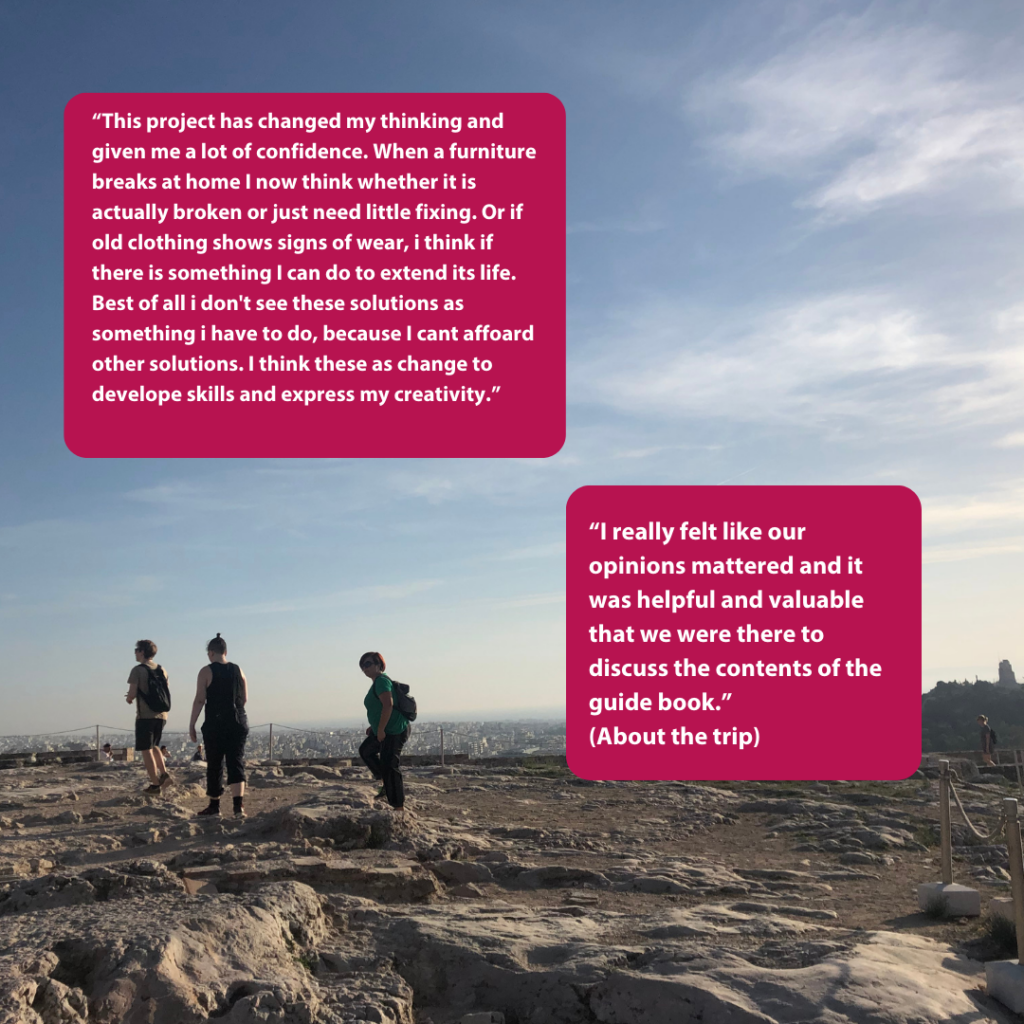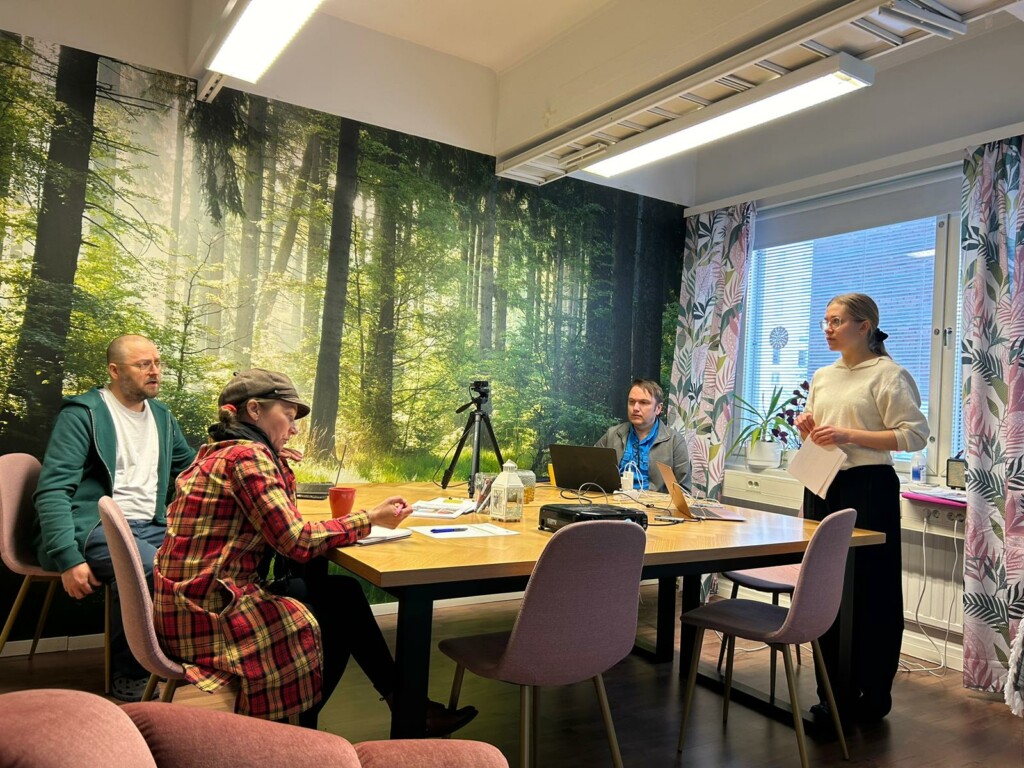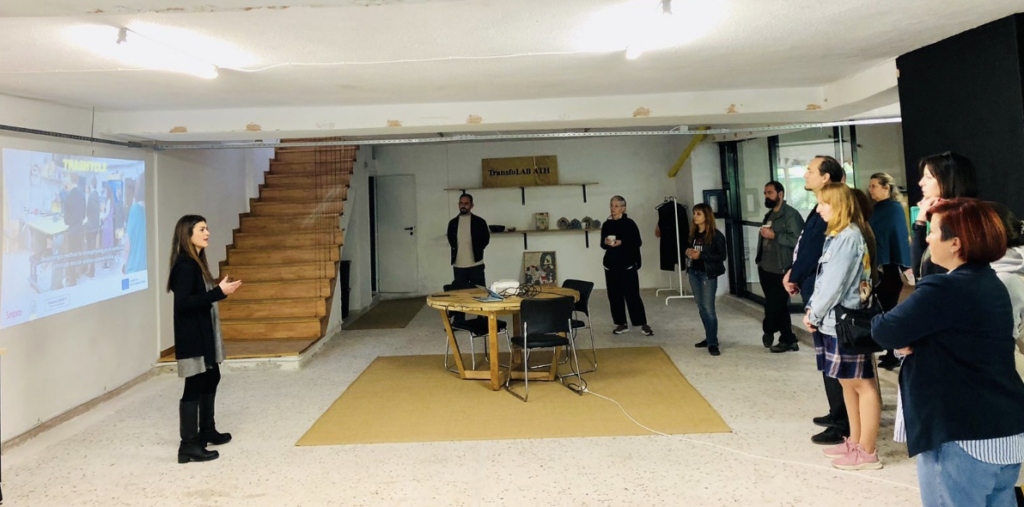Trashycle
Trashycle – Mistä on kyse?
Trashycle sai alkunsa Sospedin (Suomi), TransfoLAB:in (Espanja) ja CoLab Housen (Kreikka) ideariihestä, jossa haaveena oli tutkia kiertotalouden ja käsillä tekemisen positiivisia vaikutuksia mielenterveyden haasteisiin. Kolme järjestöä yhdistivät kokemuksensa mielenterveys-, kädentaito- ja nuorisotyön sektoreilta.
Hankkeen aikana on tarkoitus tuottaa yhdessä tietoa ja taitoa kartuttava ohjelma nuorille. Pyrimme vähentämään syrjäytymistä ja mielenterveyshaasteista aiheutuvia oireita kestävän kehityksen ja sosiaalisen kestävän kehityksen sekä yhteisöllisyyden ja käsillä tekemisen menetelmien kautta.
Sospedin Kulttuuripaja Virrassa Tampereella kokeilemme luomiamme menetelmiä pilottipäivillä varmistaaksemme, että ohjelmamme tarjoaa tietoa ja käytännön apua kiertotaloutta hyödyntävään taiteeseen ja käsitöihin sekä inspiraatioita ja vahvistusta yksilön mahdollisuuksiin vaikuttaa ja osallistua. Osallistamme myös muita nuoriosoalan toimijoita projektiin saadaksemme tärkeää palautetta kehittääksemme ohjelmaa toimivaksi erilaisille toteuttajille.
Jotta ohjelma olisi saavutettavissa mahdollisimman monelle, kehitämme tutoriaaleja ja ohjeita. Lopussa, tulemme avaamaan hankkeen kulkua ja lopputulemia disseminaatiotapahtumissa. Pyrimme antamallamme tiedolla kannustamaan nuorisojärjestöjä osallistumaan nuorten kanssa ilmastonmuutoksen haasteisiin vastaamiseen kiertotaloutta taiteessa ja kädentaidoissa hyödyntämällä.
Uskomme, että ideamme antaa apua mielenterveyden haasteisiin ja edistää hyvinvointia. Samalla nuoret kartuttavat tietoa kestävän kehityksen menetelmillä tekemisestä, yhteisöllisestä tuotannosta ja ekologisista valinnoista. Näillä uusilla opeilla nuoret voivat mahdollisesti saada apua itsensä työllistämiseen tulevaisuudessa. Nuoriso-ohjaajat toisaalta kartuttavat ohjaajakokemustaan ja saavat uusia innovatiivisia ja laadukkaita menetelmiä työhönsä.
Tavoitteet
Trashycle pyrkii kehittämään, pilotoimaan ja demonstroimaan avoimen lähdekoodin ohjelman, joka kertoo kiertotaloudesta; malli, jossa hyödynnetään jakamista, lainaamista, uusiokäyttöä, vanhan korjaamista sekä kaiken materiaalin ja tavaran kierrätystä ja uusiokäyttöä niin pitkälle kuin mahdollista. Lisäksi haluamme tehdä nähtäväksi kädentaitojen tee se itse -tyylin mahdollisuudet ja vaikutukset nuorisotyössä ja hyvinvoinnissa. Kuka vaan voi tehdä itse tavaroita yksilöllisellä jäljellä.
Käytäntö
Projektikumppanien kanssa sekä yhteistyössä nuorten kanssa luomme ohjelman, joka sisältää ohjenuoria, tutoriaaleja ja koulutuspaketin aiheesta. Yhdessä nuorten kanssa toteutettavassa pilotoinnissa kokeilemme luotuja toimintamalleja ja keräämme nuorilta palautetta siihenastisesta työstä. Viimeisessä vaiheessa toteutamme hankkeen ideaa pilotoinnista kerättyjen muutosehdotusten kanssa laajemmalle yleisölle ja käymme läpi prosessia disseminaatiotapahtumissa kunkin projektikumppanin maassa.
Tulokset
Luomme kattavaa ja kaikille mahdollista ohjelmaa kiertotalouden ja kädentaitojen parissa. Ohjelma tarjoaa mahdollisuuden tutustua globaaleihin haasteisiin paikallisilla teoilla. Tavoitteemme on viedä tämä idea käytäntöön nuorten pariin tuomaan mahdollisuuksia nuorille. Jokainen aiheesta kiinnostunut voi tämän avulla luoda merkityksellisiä polkuja ja hyvinvointia itselleen.
Hanke kestää käsissämme 2024 maaliskuuhun asti ja päivitämme nettisivujamme, sosiaalista mediaa sekä Erasmus+ sivujen raportointialustaa projektin edetessä. Vastaamme mielellämme kysymyksiin ja palautteeseen ja toivotamme tervetulleiksi aiheesta kiinnostuneet disseminaatiotapahtumiin.
Co-design -suunnittelu
Ensimmäisessä vaiheessa nuoret pääsivät tutustumaan kiertotalouden teemaan kädentaidoissa. Osallistujat kokoontuivat Kulttuuripaja Virrassa Trashycle -ryhmässä yhteisen oppimisen, keskustelun ja ideoiden vaihdon parissa TransfoLab BCN:n tietotaidon avustamana. Lisäksi kävimme vierailemassa Humbugi -nimisen yrityksen tiloissa sekä Kierto Festeillä, jossa tapasimme roskataidetta tekevän duon, BCEnsemblen. Kevääseen mahtui myös käytännön harjoitteita suunnittelun apuvälineenä ja tietenkin roskien keruuta.
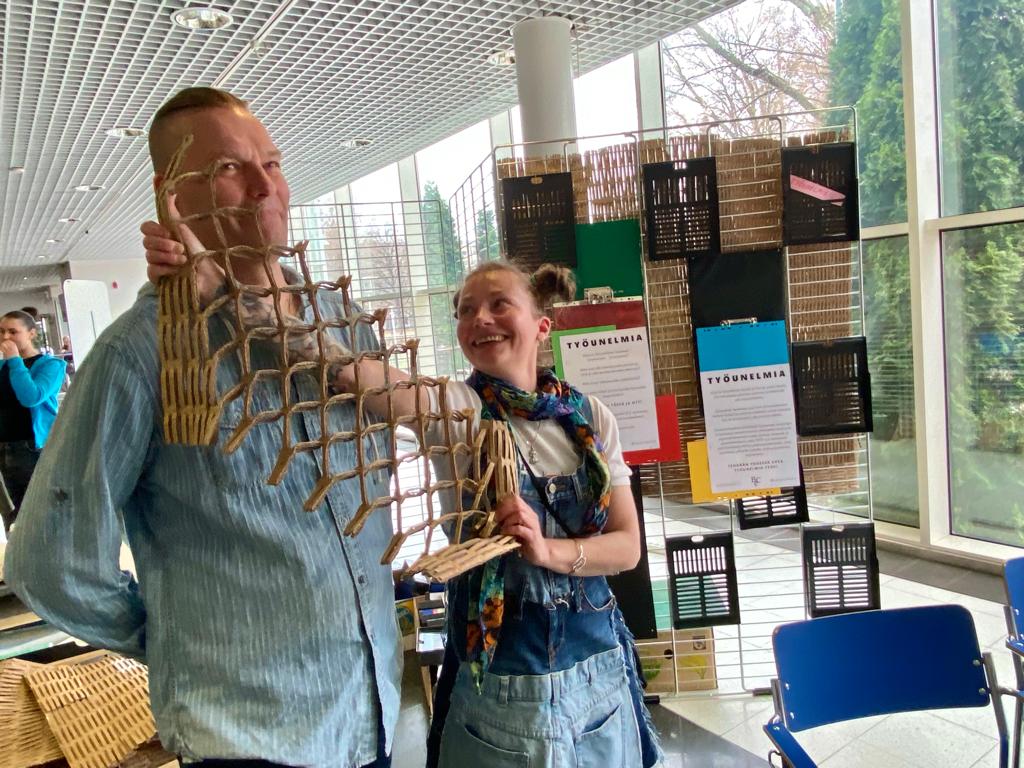
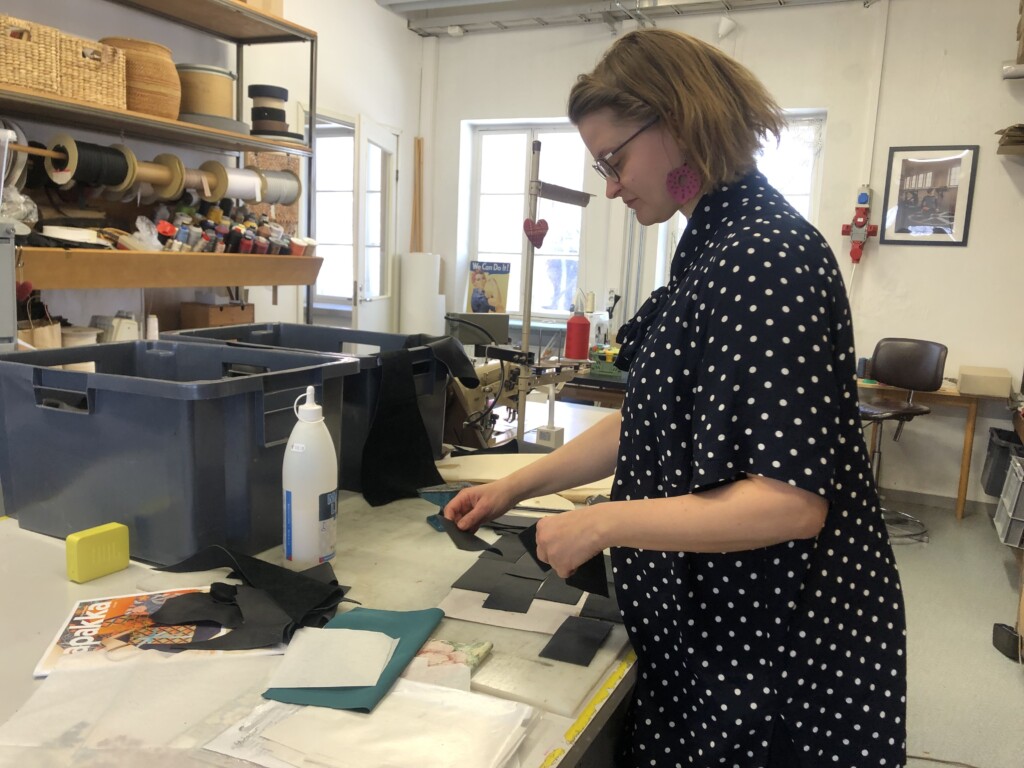
Trainingdays -tapahtuma Tampereella
Kesäkuussa Kulttuuripaja Virran nuoret pääsivät valmistamaan kevään mittaan suunnitelemiaan töitä. Järjestimme kolmen päivän tapahtuman Tampereella, jonne projektikumppanit TransfoLAB:ilta ja Colab Houselta tulivat mukaan. Päivien aikana valmistui pöytäryhmä, koroke tietokoneiden näytöille, hyllykkö ja kollaasirunoteos. Kaikki tekeleet tehtiin tietenkin kierrätetystä materiaalista! Erityinen kiitos kuuluu Mielen Ry:n Avoin Paja Inspikselle, jonka tiloissa saimme tapahtumamme toteuttaa.
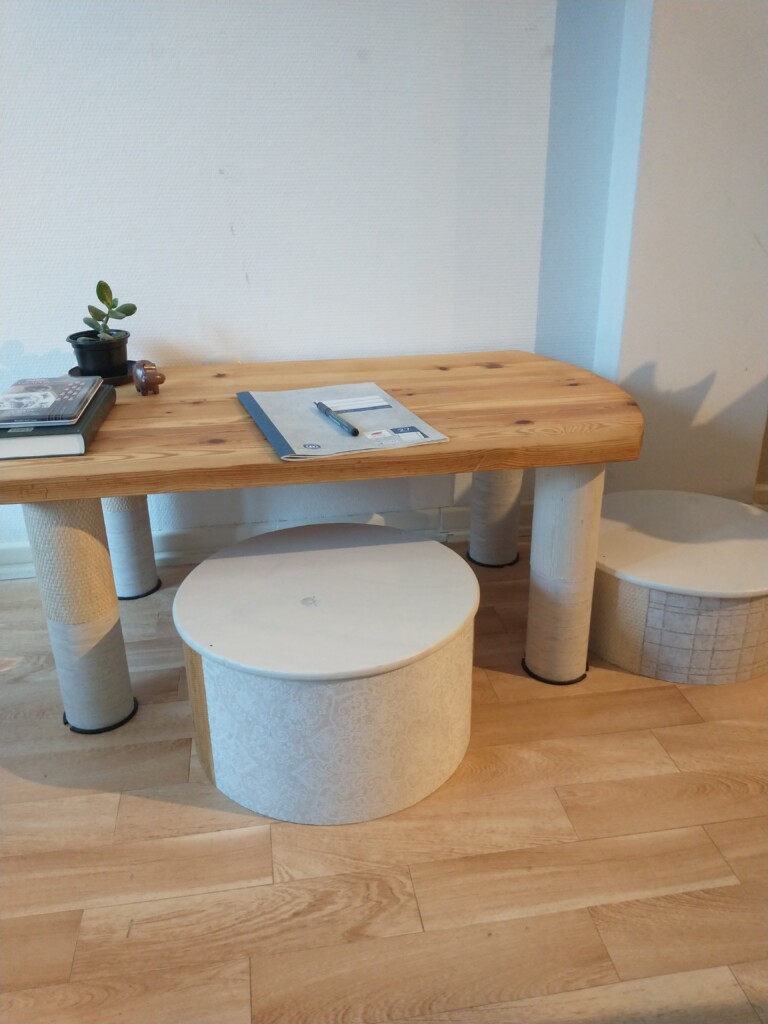
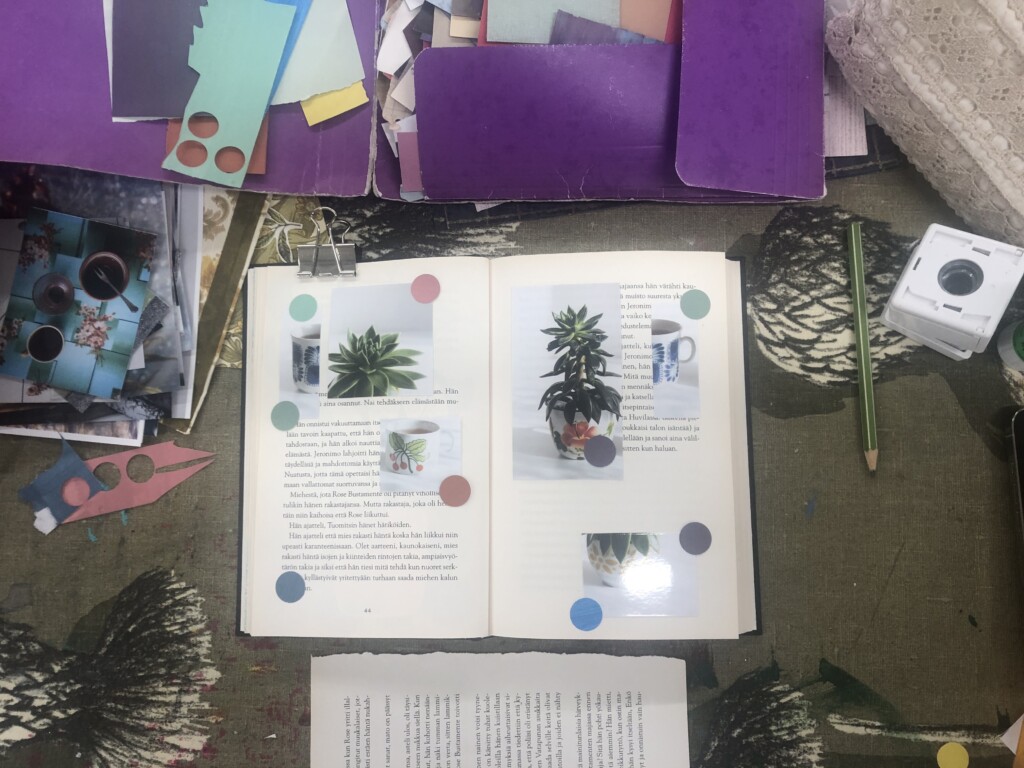
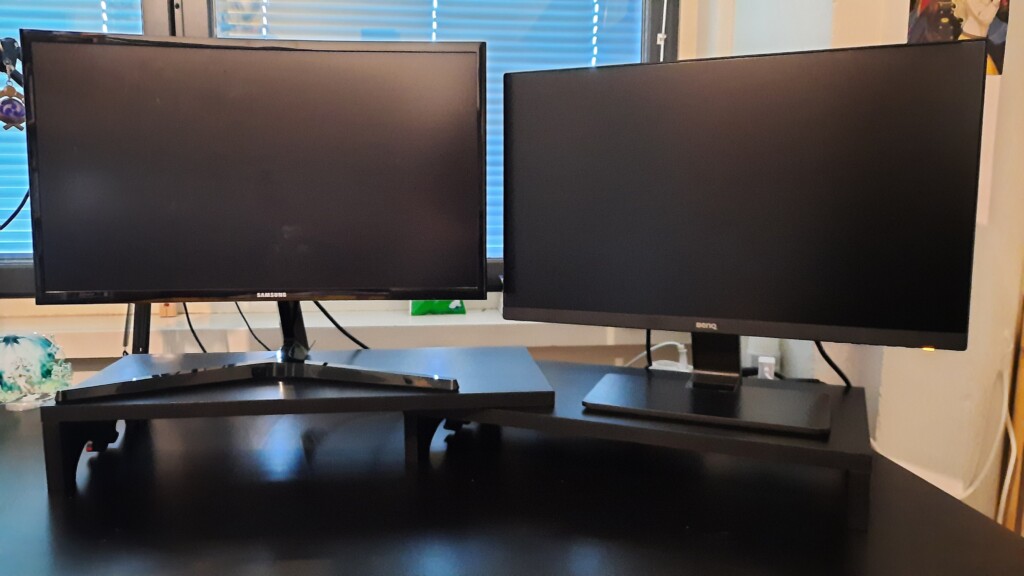
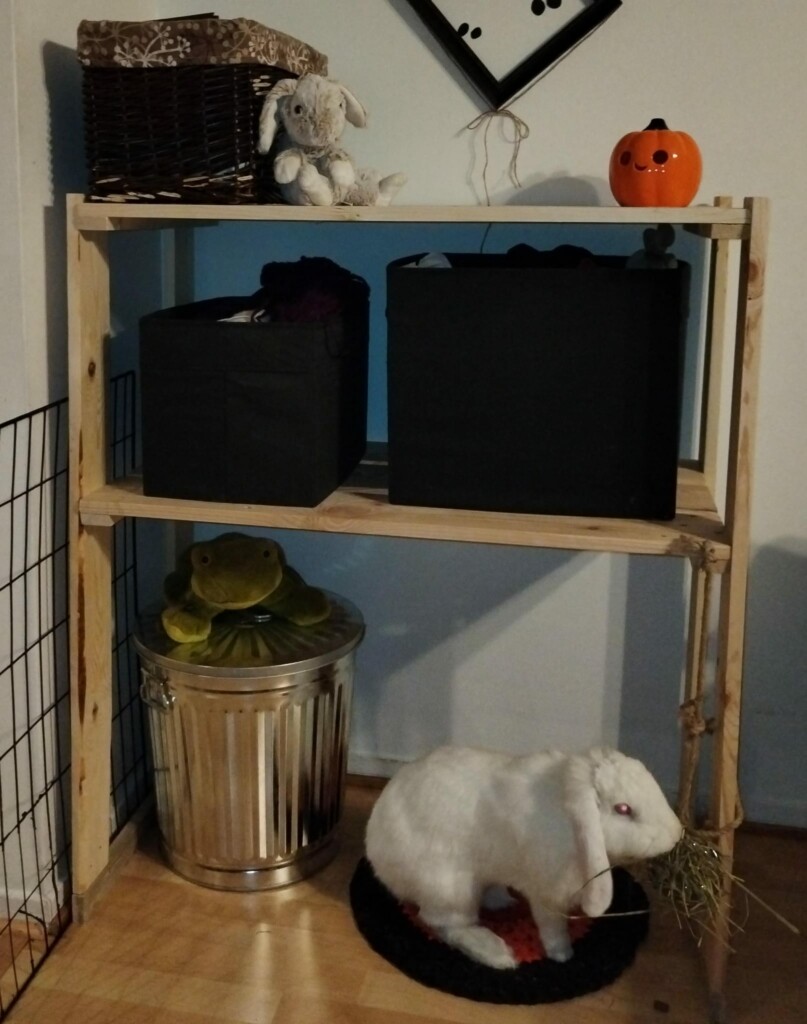
Kysely ryhmätuokioista ja tapahtumapäivistä
Kysely projektin vaikutuksista nuoriin
Matka Ateenaan
Projektikumppanit tapasivat lokakuussa Ateenassa projektin kolmannessa vaiheessa. Työstimme ohjekirjaa, jonka julkaisu olisi projektin yksi päätavoitteista. Kirjan avulla kuka tahansa aiheesta kiinnostunut pystyisi tarttumaan toimeen. Mukana matkalla oli kaksi Kulttuuripaja Virran nuorta. Nuoret osallistuivat kirjan sisällön arvioimiseen ja antoivat tärkeää palautetta, jonka avulla saimme muokattua kirjasta lukijaystävällisen. Keskustelimme myös vertaisohjaajuuden ja kulttuuripajamallin merkittävyydestä nuorille ja yhteisölleen. Päivien aikana nuoret pääsivät tarkastelemaan projektia sekä osallistujan, että ohjaajan näkökulmasta, sillä heillä oli kiinnostusta jatkaa kestävän kehityksen aiheen parissa ja kokemusta ryhmän ohjauksesta.
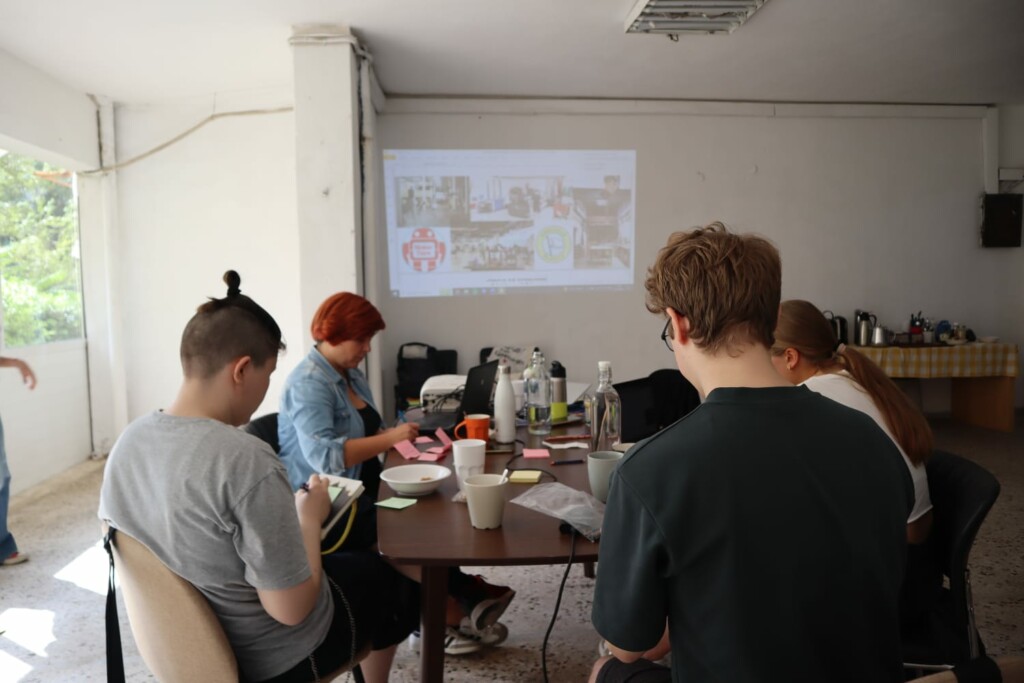
SSYK seminaari
Sosped esitelmöi lokakuun 2023 SSYK seminaarissa Lahdessa Trashycle -projektia. Alla olevasta esitelmästä pääset tutustumaan projektin eri vaiheisiin sekä tuloksiin.
Disseminaatio Tampereella
Projektin viimeinen tapahtuma Suomessa paketoitiin Kulttuuripaja Virran tiloissa. Kutsuimme muut kulttuuripajat, alan muita toimijoita sekä projektissa aiemmin esiintyneen BCEnsemblen kuulemaan vuoden tapahtumista. Päivään mahtui esitelmöintiä, keskustelua projektin hyvinvointiin vaikuttavista tekijöistä, sekä projektin lopputuotokseen, ohjekirjaan tutustumista. Kuulijat pääsivät ohjekirjan avulla perehtymään syvemmin ohjeisiin ja materiaaliin, jota tämän kaltainen projekti pitää sisällään. Teimme käytännön harjoitteita jakokeilimme sähköistä Mural-työkalua, ja pohdimme, miten projekti olisi räätälöitävissä kunkin tahon omaan arkeen sopivaksi. Kiitos paikan päälle saapuneille ja lankoja pitkin osallistuneille toimijoille!
Ohessa on tiivistelmä kyselyn tuloksista, missä kartoitimme osallistujien ajatuksia projektistamme.
Disseminaatiot Kreikassa ja Espanjassa
CoLab House järjesti kreikkalaisille organisaatioille tapaamisen, jossa tutustuttiin projektin sisältöön sekä ohjekirjaan. Osa järjestöistä tutustui aiheeseen itsenäisesti ilman osallistumista tapaamiseen. Järjestöt antoivat projektista palautetta ja se on luettavissa oheisesta esitelmästä.
TransfoLAB BCN järjesti TrashTalks -tapahtuman, jonka kohderyhmänä oli sosiaaliset ja inklusiiviset projektit teemalla, Well-being through design and fabrication. Keskustelutuokio pyöri kiertotalouden, yhteisöllisen suunnittelun ja kestävän valmistuksen ympärillä. Tämä kaikki oli tietysti liitetty hyvinvointiin ja Trashycle -projekti pääsi yhtenä TrashTalkin pääaiheista kertomaan näiden asioiden linkittymisestä.
Materiaaleja omaa projektiasi varten
Tässä on projektimme lopputulos, ohjekirja! Vaikkakin positiivisten vaikutusten todentaminen hyvinvoinnille ja mielenterveydelle olivat projektissamme tärkeimmässä roolissa, on tämä ohjekirja välttämätön, kun haluat ryhtyä tuumasta toimeen.
Työstimme ohjekirjan, jonka avulla jokainen aiheesta kiinnostunut voi perehtyä perusteellisemmin hyviksi kokemiimme menetelmiin. Ohjekirja sisältää tietoa muun muassa projektin toteuttamisesta, suunnittelun eri vaiheista sekä harjoituksista.
Kaikki materiaalit löytyvät tämän linkin takaa
-ohjekirja, joka sisältää käytännön harjoitukset
-esitelmä kiertotaloudesta ja kädentaidoista
-esitelmä elementtien yhdistämisen tavoista

Basic Outline
During this project, we will initially co-design a pilot program of capacity building and problem-solving activities for the youth, aiming to alleviate mental health and exclusion risks through methods that involve circular, social, participatory economy and the maker movement.
Following this stage, the pilot program will run with the involvement of the youth beneficiaries from Culture House Virta in Tampere (Finland), to test the process developed and verify that it offers education on the emerging topics mentioned above, while it also stimulates and inspires engagement in collaborative activities that increase confidence in making a social difference.
Finally, the program will be applied by a number of organizations in different settings and locations, with the intention to receive valuable feedback, revise our methodology and produce an effective, robust, and flexible program.
As our ultimate purpose is to allow every interested organization to implement the final comprehensive and robust program, we will create tutorials and guidelines that will be disseminated in an open source and open access way online and through dissemination events. This way, youth organizations will be able to inspire and guide the young people to actively participate in their societies by working on global challenges, such as climate change, through local collaborative activities based on creativity, circular economy and the maker movement.
We are convinced that the mental health and wellbeing of the participants will be substantially improved, while they will also gain useful knowledge in sustainable design, collaborative production and important green skills. Their new skills can also be used for future (self)employment opportunities, while the youth workers that will apply the developed program will be able to introduce innovative, creative and quality activities in their organizations, opening the way to the recognition of youth work.
Objectives
Trashycle aims to develop, pilot and demonstrate an open source program that introduces circular economy (model of production and consumption, involving sharing, leasing, reusing, repairing, refurbishing and recycling materials and products as long as possible) and maker movement (cultural trend that places value on an individual’s ability to be a creator as well as a consumer of things) as a tool that can be used by youth workers to bring wellbeing to youth with mental health conditions.
Implementation
Through participatory action based co-design with the target groups we will develop the program, including guidelines, tutorials and training curriculum. Through collaborative pilot testing we will review the practical applicability of the program in a real context and with a group of youths. In the final demonstration and dissemination activity we will challenge the content in various contexts/locations and share the final outcomes in dissemination events.
Results
This is a robust and holistic program centered around circular economy and maker movement, offered in open source and open access ways, that allows youth to address global challenges through local activities. The intention is to enable organizations, youth centers and youth workers, working with young people with mental health, to implement it in their regular activities with the end goal of bringing a sense of achievement and wellbeing to their beneficiaries.
Duration
The project deadline is on March 2024 and all updates will be uploaded to our websites, social media and relevant platforms such as the Erasmus+ website. We would be very happy to answer any questions and we would be grateful for your feedback and participation in our dissemination events.
Co-design phase
During the co-design phase the youth had the opportunity to learn the basics about Circular Economy, the Maker movement and some of the collaborative digital tools that were going to be used during the project. The lecture was enhanced by a visit to a maker’s studio and a Circular Economy fair. Through mapping of the local ecosystem, they were able to gather unwanted objects from local companies and organisations, including objects that were no longer needed by the Culture House in Tampere. In the sessions that followed the youths developed their design thinking through various participatory exercises, so that in the end they could design their own ideas from the collected discarded objects.


Training days on Tampere
In June the youth of Culture House Virta got to fabricate the designs they had been working on during the spring. All project partners met in Tampere during this event and helped the youth on their projects. We saw great designs coming alive; a cabinet made from pallets, a computer screen stand made from old shelves, a table and seats made of many used materials and a beautiful visual poetry book made from recycled papers. A special thank you for Mielen Ry’s Avoin Paja Inspis for letting you to use your facilities and heavy wood work equipment!




Surveys
Here you can read about youths experiences of the project. First survey includes questions about springs session days and the training day event. The second survey is about the whole journey that two of the youth went with from the first session days to the trip to Athens.
Trip to Athens
All project partners met in Athens on October in the third phase of the project to plan the final guidelines. These would be the end production of the project to help anybody interested on the subject to take the action. Two young participants from Sospeds Culture House Virta joined us on the trip to help us on the process. With their useful insights we managed to produce the guidelines to a form that inspires its reader. During the trip we also had valuable discussion about peer training and culture house action and their remarkableness. In this phase participating youth looked at the project both with the eyes of a participant and a trainer since their intentions were to continue leading groups with the theme of circular economy.

SSYK seminar
Sosped visited SSYK seminar on October 2023 in Lahti to disseminate the project. You can download the presentation below to get to know the whole process and results.
The dissemination in Tampere
Sosped’s final dissemination event was wrapped up in Culture House Virta! The rest of the culture houses, other relevant organizations and known from previous phase of the project, BCEnsemble were invited to hear out about the project results. The event consisted of presentation, conversation of the positive effects on wellbeing through making and sustainable choices, learning the contents of the guidelines made during this project and practical exercises that the co-design phase requires. In addition we got know Mural, a media platform for sharing ideas and designs in a cooperative project.
Here is a survey we made for the participating organisations about their opinions on our project.
Disseminations in Barcelona and Athens
CoLab House organized an informative meeting for Greek organisations to disseminate and inspire local entities. Part of the organisations joined this meeting to learn more specifically about the phases of the project and part of them learned it independently through the guideline and other published material. On the right you can see the results of a survey we collected based on these dissemination methods.
On the 23th November 2023 TransfoLAB BCN organised the 3rd edition of TrashTalks, with the title ”Well-being through design and fabrication”, focused on social and inclusive projects. In this edition the talks focused on circularity, co-design and sustainable fabrication as tools to achieve social innovation and wellbeing within the communities. Trashycle was presented along with two other local projects.
Materials for your own project
Here is the final outcome of our project; the guidelines! As equally important are the positive effects this project has shown to have for wellbeing and mental health. However, when you want to roll up your sleeves and get to work, this is where you should start at.
This guideline will help you guide your own project for your target group. It contains information about planning such project, exercises and knowhow of designing.
All materials can be found through this link.
-final guidelines (includes exercises)
-presentation of circular economy and making
-presentation of joining elements

